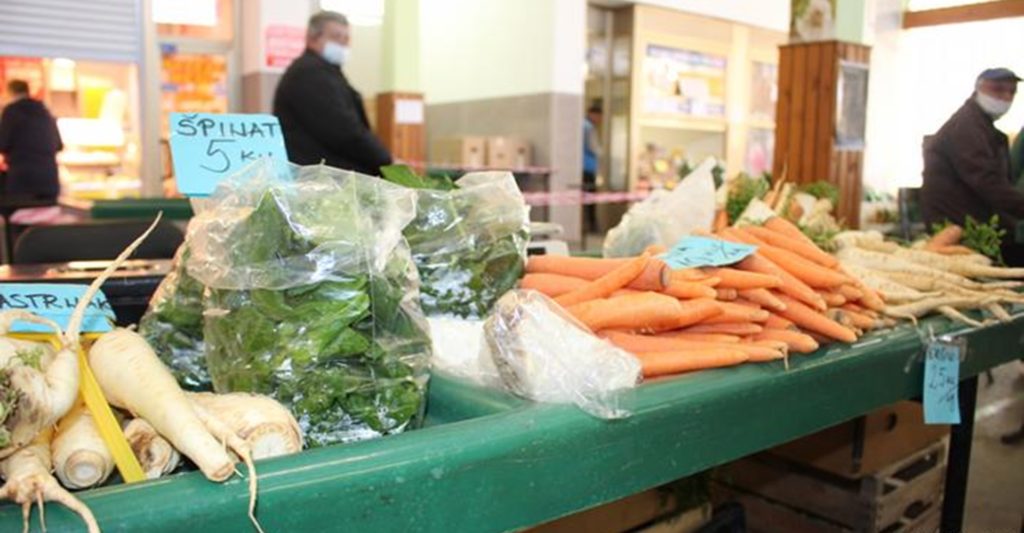After recovering from the initial shock, small manufacturers are happy with online sales. A new generation of customers has emerged who has not hit the market so far.
For twenty years, Maria Mikec has been coming from the Suhopoljska Pine to the Viritic City Market. On Tuesdays, Thursdays and Saturdays, she offers customers different types of salads, carrots, parsley, spinach, onions, radishes and all the other vegetables she produces in her three greenhouses. And never before was the market closed to prevent the spread of the Covid-19 virus. “I was shocked. The questions were: What do we do now, what about manufactured goods, how long will it take, how do we survive? It’s been a tough two weeks, full of uncertainty. We did manage to sell something on the doorstep, but that’s not it, “Maria tells DW.
A package of measures
But farmers immediately teamed up and set up Facebook groups for ‘Fresh and Homemade from Our Market’, which brought together several thousand members overnight. Online platforms that connect manufacturers and buyers to promote local manufacturers were later set up across Croatia by development agencies or municipalities and cities, or owners of city markets.
Željko Pavić from Korija online orders and delivery of products to customers’ home addresses is a completely new experience. With various types of vegetables in seven greenhouses and outdoors, it produces 250 eggs a day. “It’s a great sales channel that I didn’t think of until yesterday. I’m satisfied. Those who ordered it saved my egg production. I will keep the web store even when all this calms down, “Pavic points out.
Buyers and sellers are aware that the virtual marketplace cannot completely replace the real marketplace and that paying on the payroll will always be a part of many people’s rituals. After the initial shock, Suzana Svirovska quickly came forward, who optimistically claims that something very positive has emerged in this whole crisis. “We are getting brand new customers, younger people who haven’t come to the market before. Hope this is not a trend. I would love to continue that way in the future as well, “says Svirovska.
The Croatian Ministry of Agriculture also reacted very quickly and immediately issued a package of 11 ‘anti-virus’ measures, and then announced a delay in repayment of the credit debt in case of failure to repay.
State aid
As the measures for restricting traffic, opening hours of shops and inability to sell in the markets led to disruptions in the placement of milk and dairy products, fruits, vegetables and other products, the Government decided to buy surpluses. The purchased products will be ceded to intermediaries in the food donation chain. A central digital marketplace has also been set up to make it easier for contracting authorities to find suppliers and to facilitate the sale of domestic agricultural and food products.
Mirko Katalenic, a farmer from Gudovac near Bjelovar, who has 67 dairy cows in the barn and receives 1,200 liters of milk a day, told DW that production runs normally and that dairies have no major problems. “At the Bjelovar market, dairies have 30 retail outlets and most have no warehouse space, so the government purchase for humanitarian purposes saved us,” said Katalenic.
Co-operability of large sales chains
In order to help preserve the production of small farmers, Dukat Dairy Industry has launched a joint purchase of milk from those who cannot market their products in the markets. They point out that this is necessary because milk production and the number of dairies have been steadily declining for ten years, so that Croatia’s raw milk production meets less than 50 percent of its needs.
The Ministry has asked the largest retail chains in Croatia for better marketing and recognition of small producers. In just ten days, Kaufland received numerous applications. 60 manufacturers have met all the requirements and are shortlisted, and applications are still being received. It has been reported from that chain that they have purchased almost three thousand tonnes of locally grown fruits and vegetables in five weeks.
Konzum is reported to have partnered with 200 new small producers who have joined the group of more than four thousand farmers and OPGs with whom Konzum is already working. Spar expanded its cooperation with new partners with agricultural cooperatives involved in flower production, companies and crafts that produce fruit, citrus, berries, vines and strawberries and herbs.
Importance of domestic production
Agricultural associations welcomed the initiative and recalled that it is in the wake of what they have been seeking for years: short supply chains, direct sales and the obligation for shopping centers to have at least 50 percent of domestic goods. But most are skeptical. They consider the current broad hand hypocrisy and fear that when the corona passes, everything will be old again. “But it’s never too late for a fresh start, to be honest,” said Stjepan Zoric, vice president of the Croatian Fruit Community.
Croatian farmers point out that such situations show how important domestic agriculture is and investing in its own resources. They expect that even after this crisis, the state will realize the shortcomings of agricultural and food production and that future measures will also be directed towards the revitalization of the entire sector. “Now is the time for Croatia to think carefully about its farmers and its own food and make a strategic decision: do we want to be fed by someone else or can we live off what we produce ourselves. Our farmers have potential, but the state has to help us, “says Suzana Svirovska.
DW / Balkantimes.press
